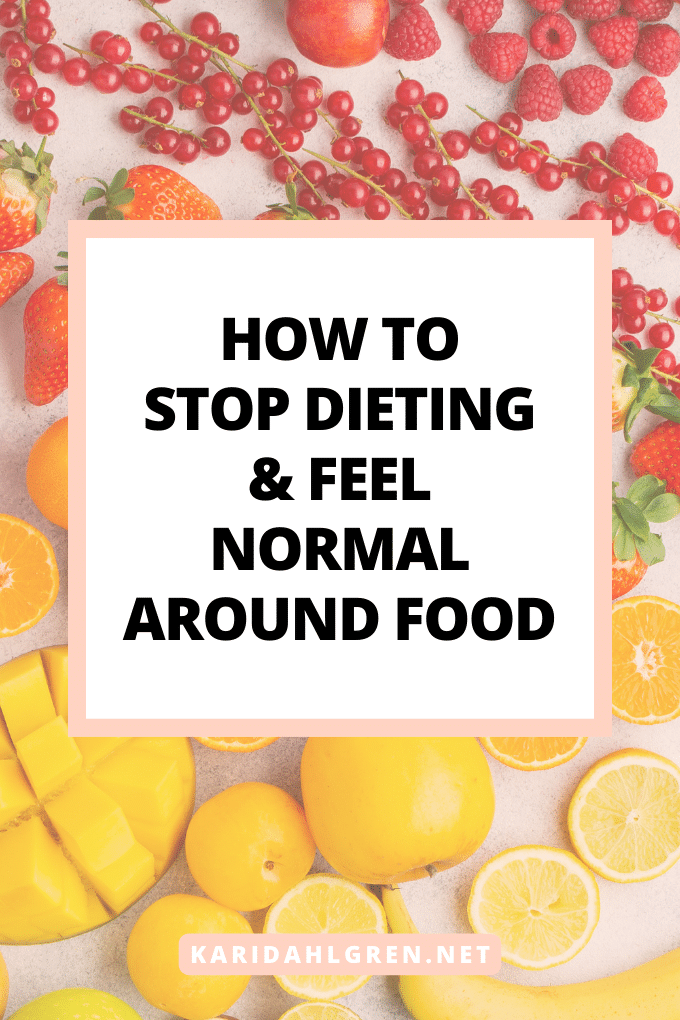
If you’re frustrated with the unending cycle of yo-yo dieting, then learning how to stop dieting and eat normally could be the revelation you need. Perhaps you’re currently standing at the crossroads with your relationship with food. One path is lined with rigid rules and an endless cycle of guilt and deprivation while the other path, less trodden, promises freedom from tracking what you eat and feeling like you’re always thinking about food.
Every weight loss story that begins with high hopes often ends in discouragement. Despite our best intentions, the self-defeating cycle of yo-yo dieting doesn’t lead us towards the healthier, happier life we dream of. Instead, we find ourselves trapped in a vicious cycle of temporary victories followed by weight regain, bruised self-esteem, and diminishing mental and physical health.
It’s time to liberate ourselves from the diet-induced restrict-binge cycle, break free from the tiresome war with the scale, and reclaim the joy of eating. Together, we’ll discover the empowering practice of ‘normal eating,’ a path that leads to better physical and mental health and a nourishing relationship with food.
Understanding Why Diets Don’t Work
Dieting, at its core, usually represents an effort to improve oneself — a pursuit of better health, a stronger body, or maybe even a boost in self-esteem. But, what if the well-trodden path of dieting isn’t the most effective route? Furthermore, what does it do to our self-esteem in the long run when we become trained to think of thinness as a ‘better version’ of ourselves?
Dieting is the practice of restricting our dietary intake to certain types of foods, or significantly reducing the total amount we eat, with the primary aim of losing weight. People usually start diets with good intentions and a burst of motivation. But despite this initial zeal, diets are clinically proven to fall short in delivering sustainable results.[1]
Our bodies are actually designed to resist weight loss because, from an evolutionary perspective, losing weight was synonymous with periods of famine.
When you significantly reduce your food intake, your body responds by slowing down your metabolic rate — the rate at which you burn calories — to conserve energy.[2] This is the exact opposite of what you want when you’re trying to lose weight.
On top of that, dieting can have an impact on important hormones in your body. Levels of ghrelin, also known as the ‘hunger hormone’, can increase, leading you to feel hungry more often. On the flip side, levels of leptin, the ‘satiety hormone’, can decrease,3 meaning it takes more food than usual to make you feel full.[3]
All of this leads to a phenomenon all too familiar for many dieters: the dreaded yo-yo effect, also known as weight cycling. This occurs when you lose weight while dieting, only to regain it once you stop dieting.
One study even goes on to state,
One potential explanation for how repeated weight cycling impacts depression is through its positive relationship with internalized weight stigma – the more frequently people lose and then regain the weight, the more they internalize negative beliefs about the self, the more frequent their depressive symptoms.[6]
As you can see, dieting can potentially create more mental and physical health problems than it tries to solve. It’s not about demonizing the intention behind dieting, which is often rooted in self-improvement. Rather, it’s about finding a healthier, more sustainable approach to nourishing your body and mind — one that doesn’t involve depriving yourself or battling with your body’s natural instincts.
What Exactly Does It Mean to ‘Eat Normally’?
If dieting is about setting rigid rules and restrictions around food, then “normal eating” is all about listening to your body’s innate cues and respecting its needs. It’s a shift away from the diet culture, one that places weight outcomes on a pedestal, towards an approach that prioritizes health outcomes and psychological well-being.
Recent studies have shown that traditional diets that encourage people to consciously restrict their dietary intake are not only ineffective in maintaining weight loss, but also lead to psychological distress and promote unhealthy eating behaviors.[7] The study states,
Higher levels of restrained and emotional eating were associated with lower body satisfaction and self-esteem, and higher [body mass] among participants.
In other words, restriction leads to gaining weight and feeling even worse about yourself. On the contrary, non-diet approaches have been found to significantly improve eating habits, body image, and mental health.
In a comprehensive review of 20 different programs that encouraged a non-diet approach to eating, participants ended up forming healthier eating habits, feeling better about their bodies, and letting go of the intense desire to be thin.[8] In short, non-diet programs helped participants thrive both physically and emotionally over the long term.
So, how does ‘normal eating’ work in practice? At its core, it involves responding to your body’s internal cues of hunger and fullness. It means eating when you’re hungry, stopping when you’re full, and not feeling guilty about your food choices. It’s about balance, flexibility, and mindfulness.
With ‘normal eating,’ you consider what foods you genuinely want, eat them when you’re hungry, and stop when you’re full. It’s about making conscious, enjoyable food choices that not only fill you up but also truly satisfy you, ultimately contributing to a healthier and happier relationship with food.
‘Normal eating’ is not just about what you eat or how much you eat; it’s also about the why and how – tuning into your body’s signals, respecting your cravings, and most importantly, finding satisfaction in your meals. In the next section, we’ll explore how to transition from a dieting mindset to an intuitive eating approach.
How to Stop Dieting and Eat Normally: 10 Evidence-Based Steps
Now that you’re aware of the evidence-based reasons why giving up dieting can benefit your physical and mental health, it begs the question, how can one learn to stop dieting and, more importantly, ‘eat normally’?
After spending years diligently counting calories or tracking Weight Watchers points (all without losing weight long-term), how can one begin to untangle the deeply intrenched habits and values of diet culture?
Here are ten steps that can help you slowly learn how to stop dieting and eat normally:
1. Get Back in Tune with Hunger and Fullness
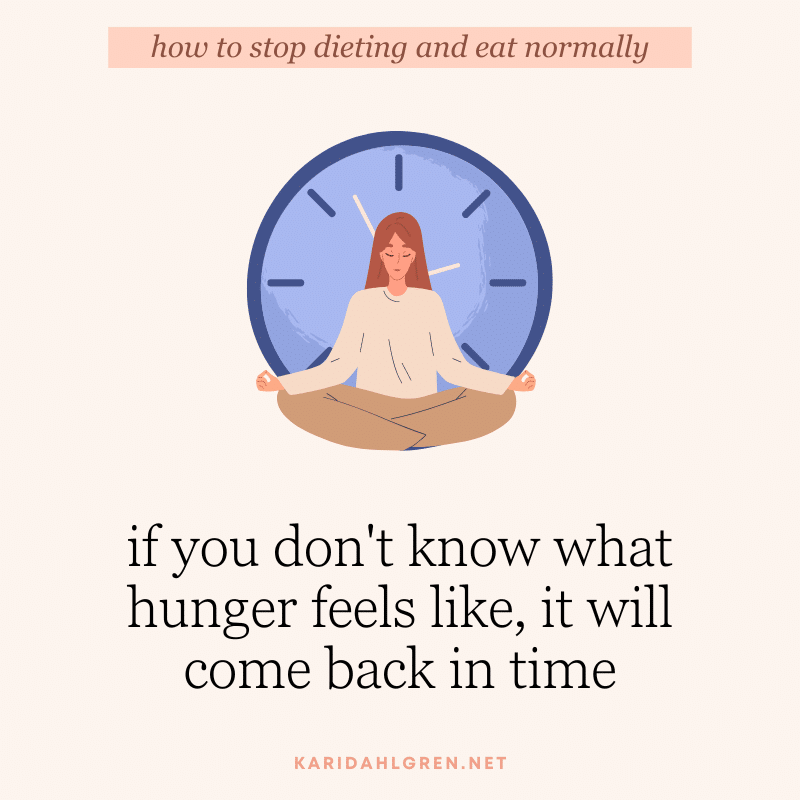
To unlearn the habits of dieting and adopt a more ‘normal’ eating style, it is essential to eat when you’re hungry and stop when you’re full. This means getting reacquainted with your body’s natural hunger and fullness cues. These cues are your body’s way of communicating its needs – when it needs nourishment and when it has had enough.
Now, if you’ve been dieting for a long time, you might find it difficult to understand these signals. Even though prolonged calorie restriction increases ghrelin, the hunger hormone, and thus makes you feel hungrier,[9] you still might not know if and when you’re truly hungry. That’s perfectly okay.
It’s a common experience for many people coming out of a long phase of dieting where external rules took over these internal signals. Trust that your hunger cues will become more apparent over time, and if you ever feel stuck, do some research to learn what physical hunger feels like.
2. Give Yourself Permission to Eat the Foods You Love
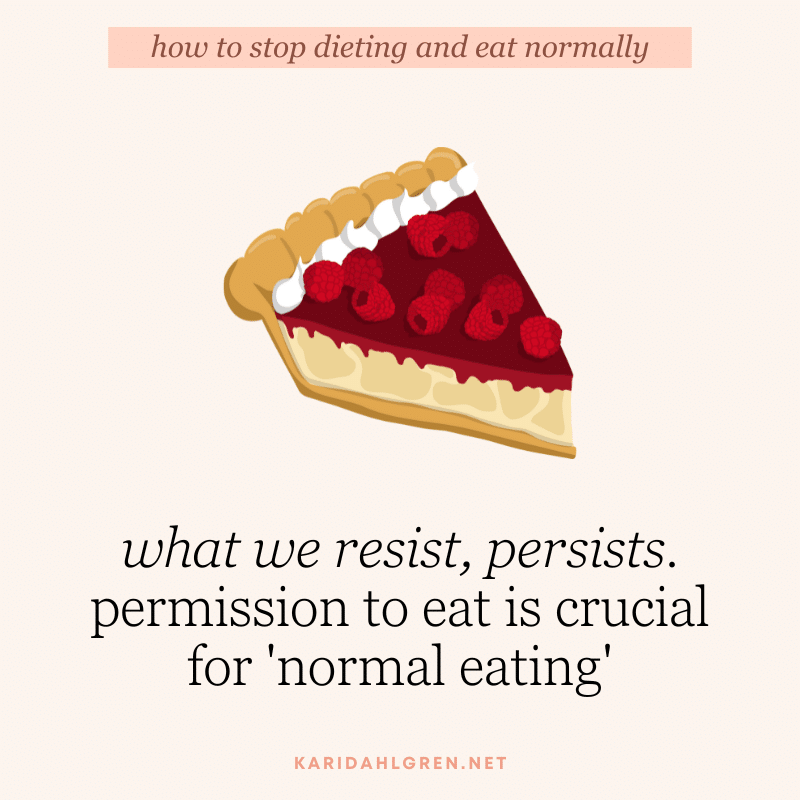
The next step on this journey is granting yourself permission to enjoy the foods you truly love. Clinical studies have found that we become more preoccupied with a specific food once we make that food off-limits.[10]
If you’ve been dieting for a while, you likely have a list of ‘fear foods‘ — foods you’ve avoided because you believe they’re ‘bad’ or cause weight gain. It can be intimidating to reintroduce these foods into your life, but it’s essential for learning how to stop dieting and eat normally.
By giving yourself unconditional permission to enjoy all foods (when you’re hungry and stop when you’re full), you can break the exhausting restrict-binge cycle. Many people find that once a food is no longer forbidden, it loses its power, and they can enjoy it in moderation without overthinking.
If you have medically-necessary dietary restrictions, such as a need to limit dairy or gluten, rest assured that this type of restriction doesn’t trigger the restrict-binge cycle as long as your intention is wellness, not weight loss. For example, eating gluten-free because you have celiac disease is rooted in wellness and therefore is unlikely to trigger a binge. However, eating gluten-free in order to lose weight, whether you have celiac disease or not, is quite likely to result in cravings for carbs and a binge later on.
Finally, if you have medically necessary dietary restrictions and you still struggle with overeating, even if your eating choices are inspired by wellness instead of weight loss, don’t worry. The rest of these tips will help.
3. Use the Stop, Drop, & Feel Method to Stop Eating Past Fullness
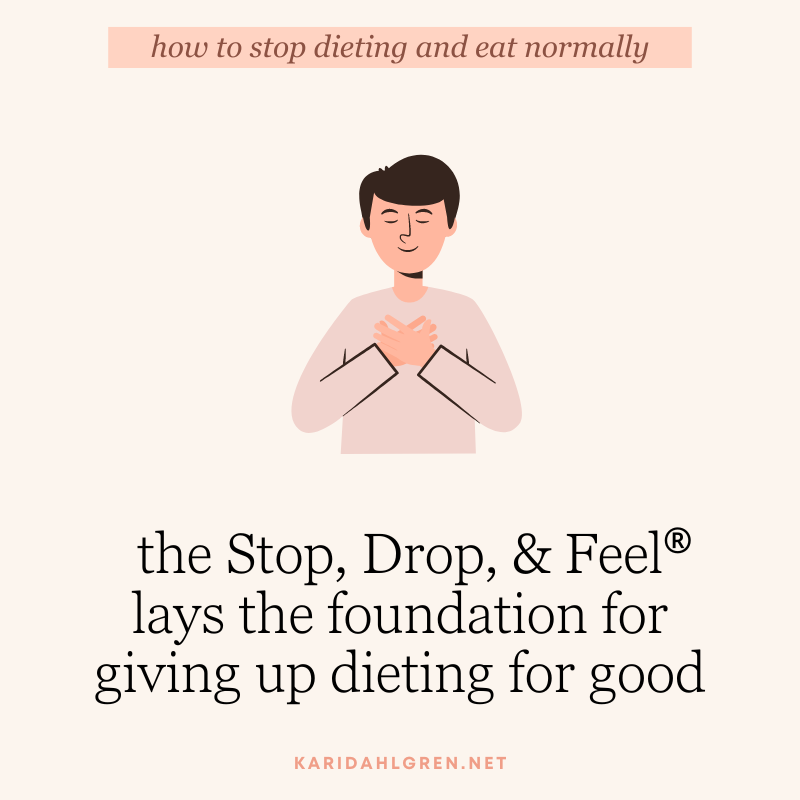
Struggling with overeating can make it hard to learn how to stop dieting and eat normally due to the fear of weight gain (which we will discuss in-depth soon). If you struggle with eating past fullness, it often helps to address the psychological reasons for overeating.
In my work as an eating psychology coach, I’ve found that most instances of eating past fullness are driven by an uncomfortable emotion that we either aren’t aware of and/or don’t want to feel. I developed a tool that directly addresses the emotions behind overeating: the Stop, Drop, & Feel®️.
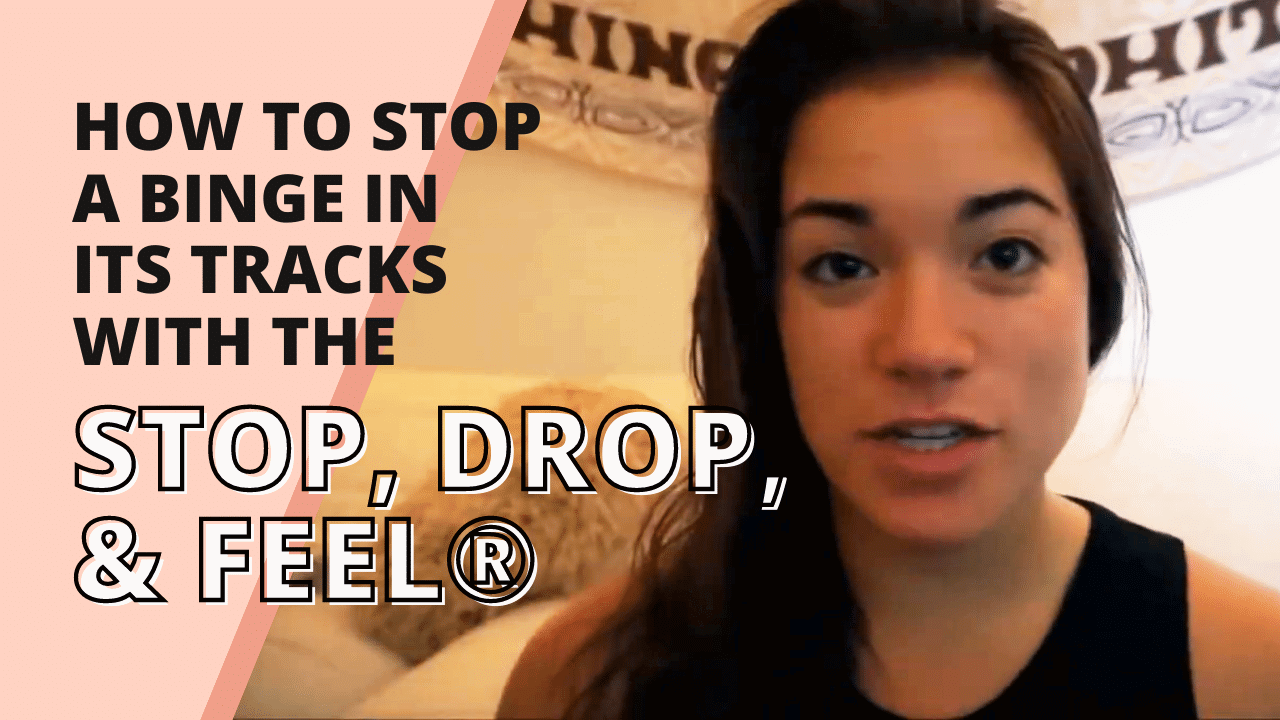
The SDF method begins with ‘Stop:’ at the point where you’re about to reach for food when you’re not hungry. Make a promise to yourself that you can still eat what you’re craving after the Stop, Drop, & Feel if you still want it. This honors the element of permission and prevents this tool from becoming another form of restriction.
Next, you ‘Drop:’ go to another room if possible, set a timer for just two minutes, and drop into your body. Explore how you’re feeling in that moment. Finally, ‘Feel:’ let your feelings coexist with you. Don’t resist your emotions or try to rationalize them away. Spend those two minutes sitting with whatever emotions are present.
This method is a practical tool for developing emotional tolerance – the ability to sit with uncomfortable emotions rather than reaching for food to cope. It’s not an easy process, but it’s incredibly effective.
4. Developing “Emotional Tolerance” — A Skill Far More Important Than Dieting
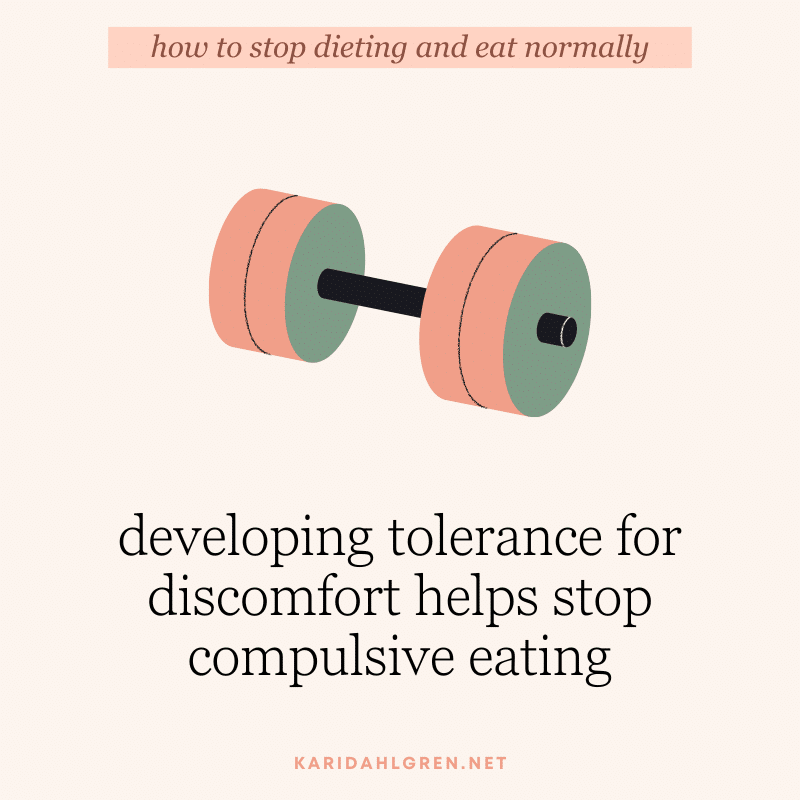
Emotional tolerance is your ability to sit with uncomfortable emotions without resorting to external buffers, like food. Studies have already found a link between low emotional tolerance and binge eating.[11] Those of us who struggle with compulsive eating have seen it first-hand when we head straight to the kitchen after a difficult day at work.
It is important to practice self-compassion when using food as a coping mechanism because sometimes it is all we know or all we have space for. Progress is made through small incremental gains, not shaming yourself for your behavior.
It is important to recognize that emotional tolerance refers to authentic discomfort, not the discomfort of dieting! Diets trigger biological mechanisms (as previously discussed) to make sure you eat. Rather, emotional tolerance is about authentic discomfort of everyday life such as difficult conversations, navigating stress, loss, etc.
Emotional tolerance is a natural byproduct of the Stop, Drop, & Feel. It forms the bedrock of Psycho-Spiritual Wellness, my method to stop compulsive eating that focuses on psychological and spiritual practices instead of dieting.
Tell me more: Psycho-Spiritual Wellness is an anti-diet philosophy. Learn all about it in my free ebook, The Spiritual Seeker’s Guide to Stop Binge Eating. Click here to grab your free copy (or nab it at the end of this post)
5. Acknowledge Any Fears of Gaining Weight & Find Tools to Eat Without Anxiety
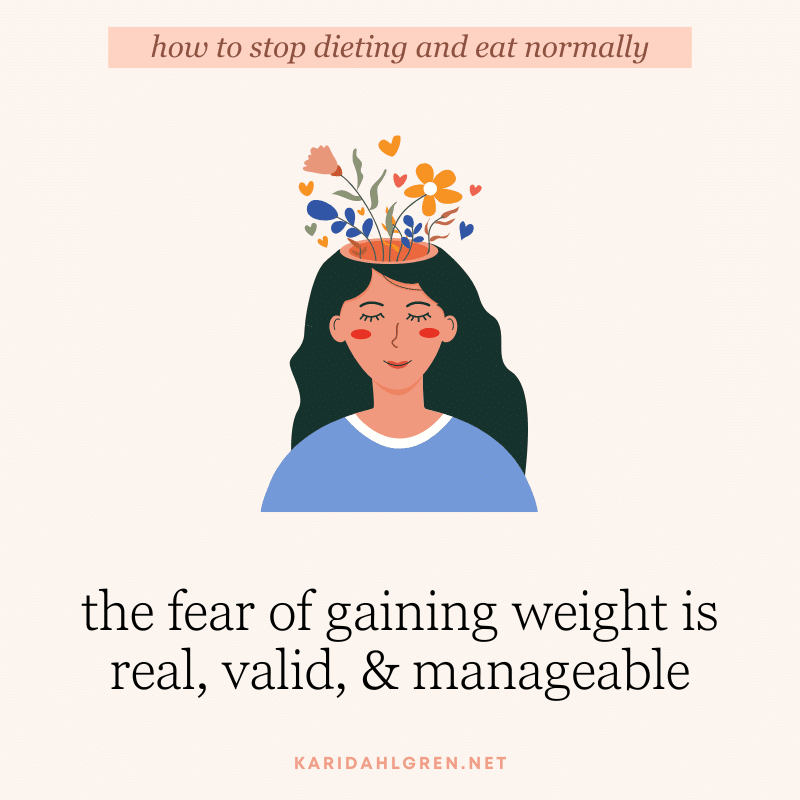
It is completely natural to harbor fears about weight gain when learning how to stop dieting and eat normally. After all, societal pressures and previous experiences can often lead us to associate self-worth with our physical appearance. It’s important to recognize these fears, empathize with them, and yet not let them control our journey towards a healthier relationship with food.
A common stage that occurs after giving up dieting is the ‘Rebellion Binge’ phase.
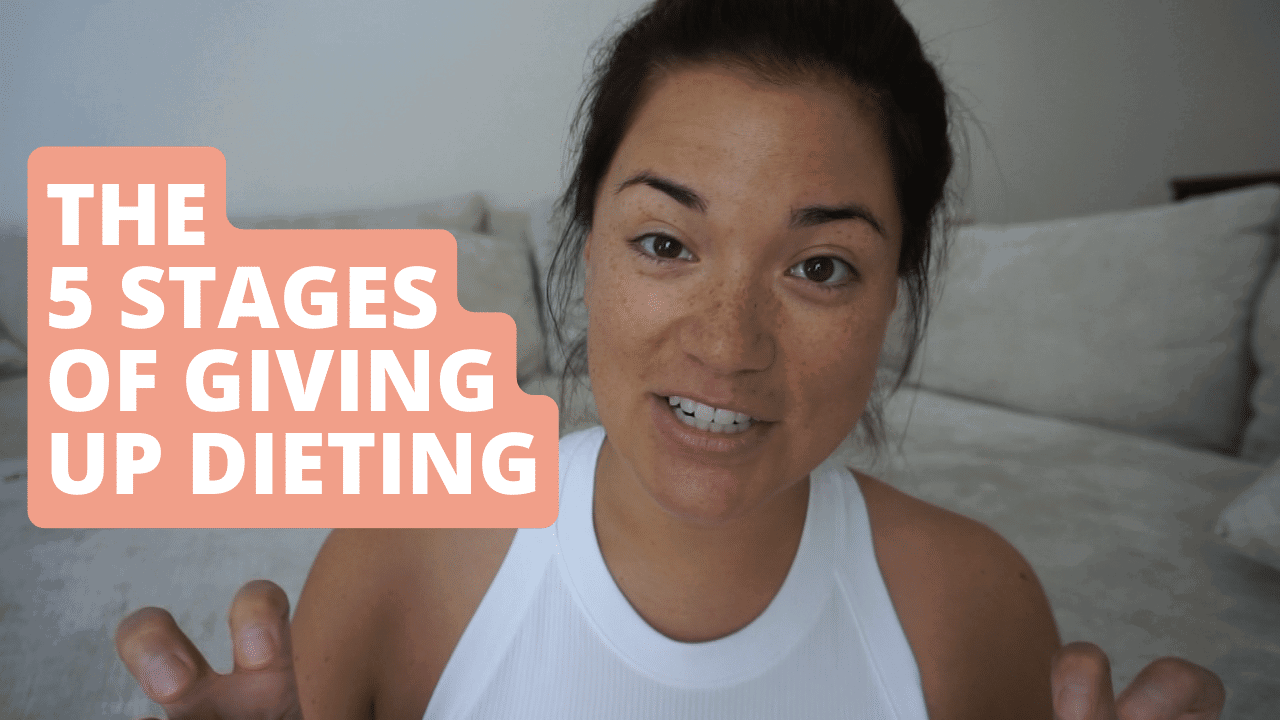
During the second stage of giving up dieting, you might find yourself craving and indulging in all the foods that were once off-limits. The sudden unrestricted access can lead to temporary bouts of overeating. However, remember that this phase is just that: a phase. It’s a normal part of the process, not a setback.
During these challenging times, it’s essential to use your tools to continue building a healthy relationship with food. The Stop, Drop, & Feel should become a daily practice at this stage. It will help you discern between desires to eat previously-forbidden foods due to true physical hunger — in which case you should eat them and enjoy them! — and a desire to eat them to numb discomfort.
6. Focus on Foods That Satisfy You
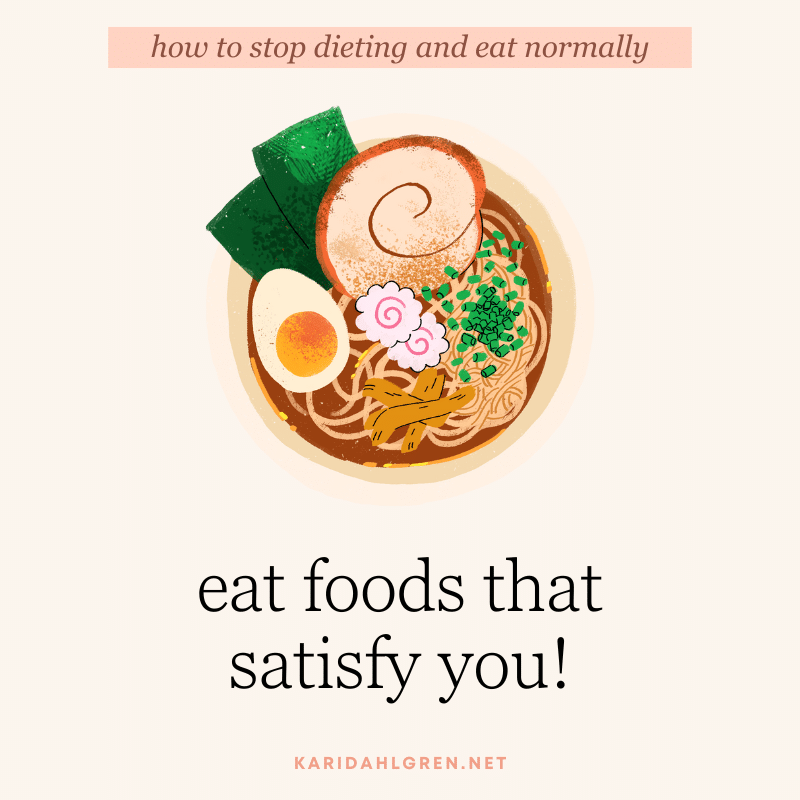
Satisfaction is a critical yet often overlooked component of our eating experience. In fact, satisfaction with eating is associated with lower body weight in both men and women.[12]
The world-famous Weight Watchers diet used to rigidly forbid specific foods like bacon and peanut butter. Yet, this backfires. Not only does restricting specific foods increase our preoccupation with them, but it reduces eating-satisfaction if bacon is what you truly want.[10]
Perhaps global giants like Weight Watchers are catching onto the compelling clinical evidence in support of eating intuitively.[13] Perhaps this is why they now allow more flexible options. However, there are still heavy restrictions, which is why many people don’t lose weight on WW long-term.
In order to truly learn how to stop dieting and eat normally, it’s important to let go of the food rules and eat what satisfies you, even if it’s bacon and peanut butter!
7. Eat Slowly to Refamiliarize Yourself with Eating-Satisfaction
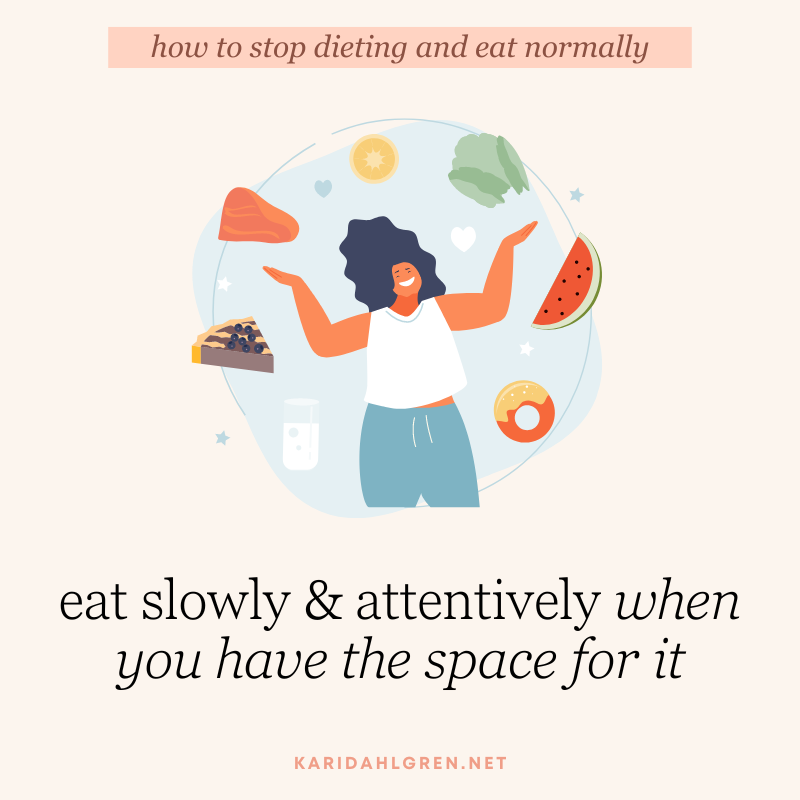
The act of eating slowly, also referred to as mindful or attentive eating, is not just about enjoying your meal but has a deeper connection to our overall eating habits. One study identified that eating while distracted leads to immediate overeating and concludes that eating attentively and slowly can help curb the pattern.[14]
However, mindful eating should not be seen as a silver bullet to counteract compulsive eating habits. Drawing from my own experience and that of my coaching clients, eating attentively doesn’t solve the root issues that drive compulsive eating — especially uncomfortable emotions.
After a stressful day, mindful eating is often inaccessible to those who struggle with compulsive eating and can induce a shame-cycle when people end up eating while watching TV anyways. This is why, although I’m in support of mindful eating, I don’t consider it a requirement on the path to giving up dieting.
8. Destigmatize Body Fat and Deprogram Diet Culture
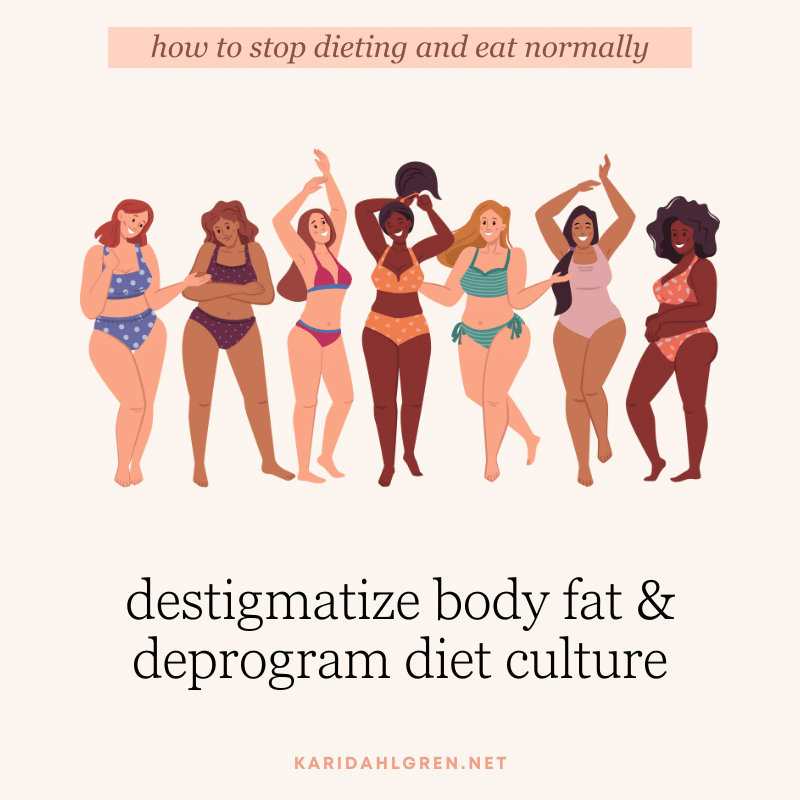
At this point, you have plenty of tools at your disposal to learn how to stop dieting and eat normally. Next, let’s talk about a mindset that can help you improve your relationship with food and body image over the long-haul: body acceptance and the rejection of anti-fat attitudes.[15]
Chronic dieting often arises from a deeply ingrained desire to lose weight, a desire that has been amplified by societal beauty standards and weight stigma.
Weight stigma gets more potent every time we fall into dieting and the restrict-binge cycle, causing us to loathe ourselves and our bodies. However, it's crucial to note that body fat is not our enemy.
Body fat, or adipose tissue, serves many essential functions in our bodies. Far from just being “extra weight,” it is vital for our physical and mental health. While it’s true that excess body fat can contribute to various health issues, having a healthy amount is crucial for maintaining good health.
Studies have shown that people with very low levels of body fat are at a higher risk for depression and anxiety.[16] This is likely because body fat plays a role in the production of serotonin, a neurotransmitter that helps regulate mood and emotion.
Instead of demonizing all body fat, we can recognize the real benefits of body fat and the critical role it plays in our wellbeing. The path to stopping dieting and eating normally begins with changing how we perceive our bodies and reframing our understanding of body fat.
9. Know the Signs of Progress with Giving Up Dieting
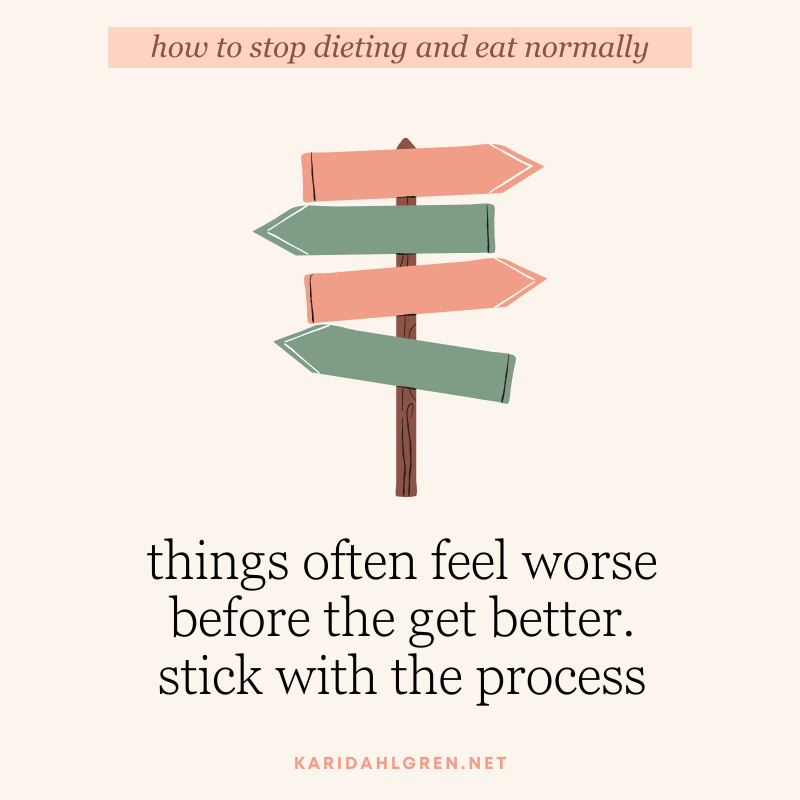
When you embark on the journey to stop dieting and eat normally, you may initially feel worse. This discomfort arises because we’ve removed the buffer of dieting and eating as a means to cope with stress, negative emotions, and life’s everyday challenges. Suddenly, we’re exposed to the raw ebb and flow of life. However, it’s important to understand that this feeling is a sign of progress.
In essence, we’re trading temporary, unhealthy coping mechanisms for a more authentic relationship with ourselves and our bodies. This shift will often involve feeling more of life’s discomforts, and it can feel difficult at first. However, this vulnerability is an indicator that you’re moving towards a more authentic way of living.
For instance, instead of using food as an emotional crutch after a stressful day, you might have to sit down and process your feelings. Instead of drowning feelings of rejection with ice cream, you might have to face these feelings head-on. And that can be a very uncomfortable process. But remember, discomfort is part of the human experience, and it’s essential for growth and authenticity.
10. Get Support When You Need It
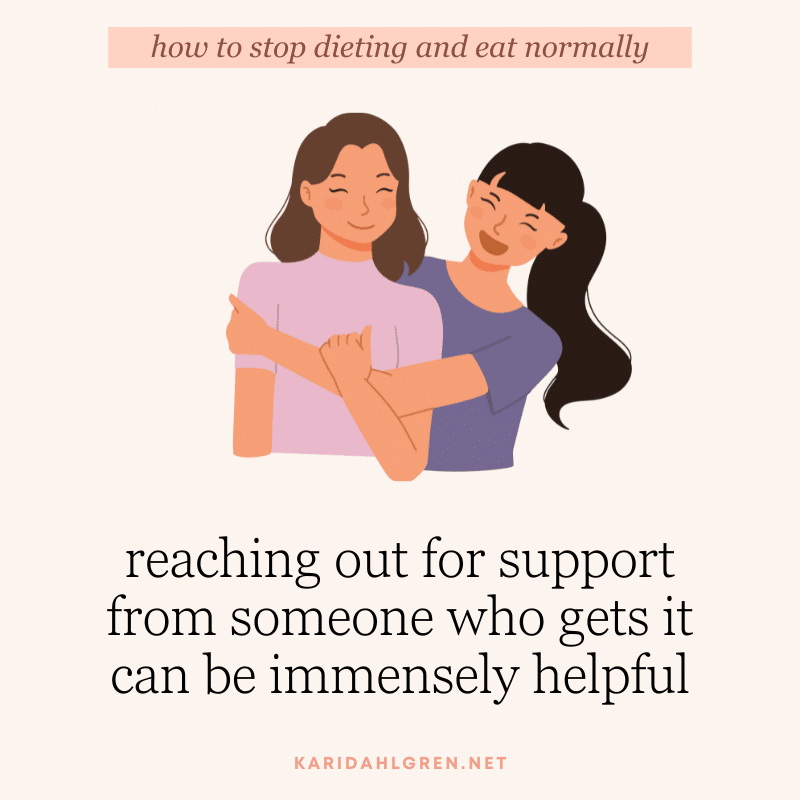
I gave up dieting on August 8, 2016. I will remember that day forever because it marks the beginning of the most rewarding journey. I have been coaching others since 2017 through my psycho-spiritual approach. I call it “Feel Normal Around Food” Coaching. If you’ve resonated with my content so far, and if you think you could benefit from extra support, I encourage you to reach out.
Giving up dieting can feel enormously groundless and trigger out-of-control feelings. It helps to have support from someone who has been there and has experience coaching others through the process.
If you struggle with an eating disorder, it’s important to get help from someone qualified to do so. Whether it’s a dietitian, psychologist, or social worker, these professionals are uniquely qualified with specific skills in managing and treating eating disorders. The National Eating Disorders Association (NEDA) has a large database of providers to help you locate someone near you.
Breaking Free from Dieting & Finding Normal Eating
Diets often lead to disappointment, weight regain, and negative effects on our physical and mental health. It erodes our self-esteem even though our bodies are wired to resist weight loss. Breaking free from the harmful cycle of yo-yo dieting empowers us to adopt an increasingly ‘normal’ style of eating.
‘Normal eating’ means listening to our body’s cues, granting permission to enjoy foods we love, and developing emotional tolerance to cope with feelings without turning to food. Progress may be challenging, but this path is abundant with growth and authenticity. Seek support if needed, and let’s embark on this journey together towards a healthier and happier relationship with food.

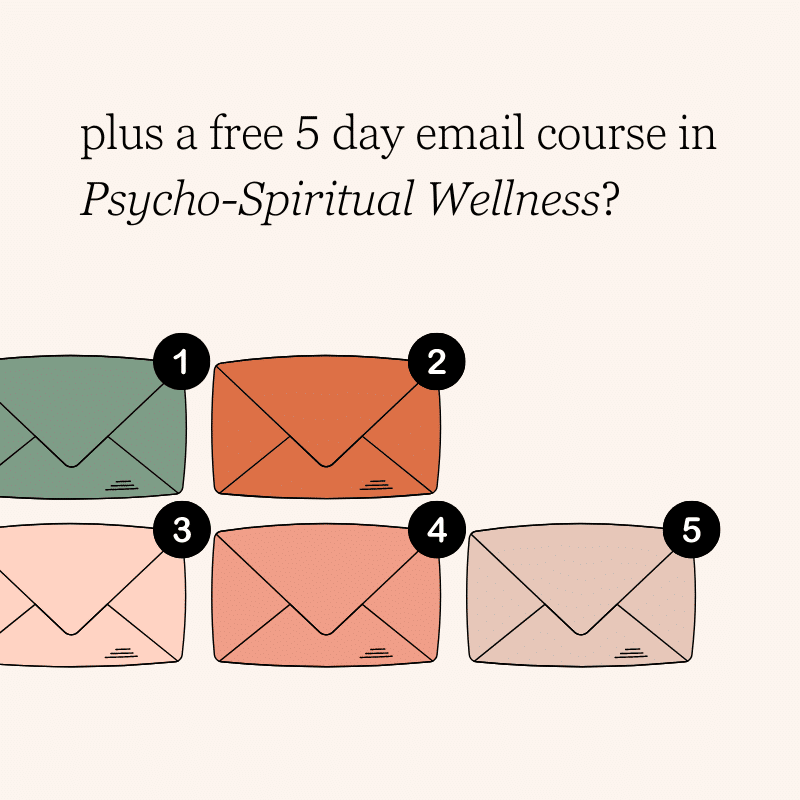
![best seller [cover of Why We Do the Things We Do]](https://karidahlgren-net.b-cdn.net/wp-content/uploads/2023/09/why-we-do-the-things-we-do-1.png)
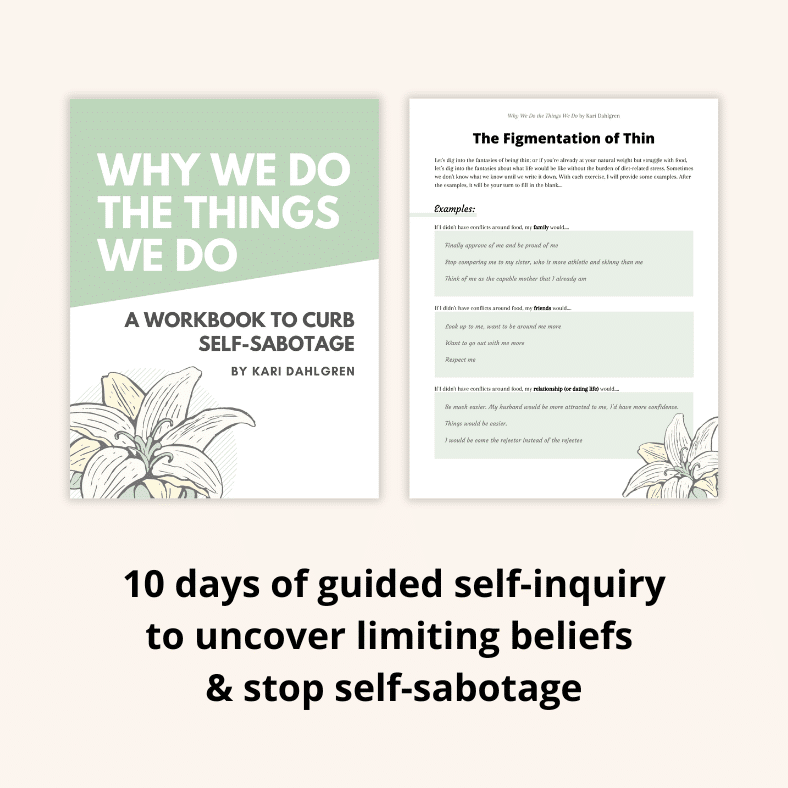
Thanks for the great read. I just have a question. I’ve tried intuitive eating for a few weeks and I found that I only hit about 1300/1400 cals a day which is waaaaay under my BMR (1480) and TDEE (2000). Should I try and get my cals up to par before intuitive eating?
Thanks!
Hi Loreli! These are great questions, you’ve clearly done your research! Keep in mind that I am not a dietitian and I am not qualified to give advice about what to eat. It is my personal opinion that you can get started with intuitive eating now. I would bet that, as you deepen your practice, you will naturally start to eat more. If this makes you nervous at all, I would hold off and focus your attention on the Stop, Drop, & Feel. I hope this helps! Again, I am impressed by the thought and research that you’ve clearly already done!
Hi Kari,
Great post, I enjoyed it very much. I wanted to share with you that I’ve been dieting for two years now, and developed a binge eating disorder because of that. I’ve lost a lot of weight succesfully, but gained it again and even more.. this cycle happened 2 times. Recently I stopped counting calories because I went on vacation with my friends, and could mantain my weight. But now I wanted to cut a little bit more and ended up bigeing like 12 days in a 3 week period. My issue is that I’m actually working as a model and I’m afraid of gaining too much weight. But today I binged again and decided I had enough, as for tomorrow I will eat whatever I want and until I’m full. Just wanted to share my story, your story has inspired me.
Thank you,
Felipe
Hi Felipe! Thank you so much for your comment. I totally get you, and I have no doubt that so many other people relate to you too. The pressure to be thin when your job revolves around your looks can be really intense. You are very strong! Keep me posted on how the process of giving up dieting goes for you. I’d love to help support you in any way that I can.
Hi! I have a couple questions about learning how to eat when you’re hungry and stopping when you’re full. What if you aren’t sure how to do that? Are there certain steps/questions to ask yourself every time you eat? Are there certain signs? I’m not sure what hunger and fullness feels like and often times don’t know what in craving because of 10+ years of restricting and being unhappy with my body. I’m in the process of learning new skills and trusting myself again. I’ve made huge progress, but it’s just about fine tuning some areas of my life. Is there a food journal you recommend? I’m learning how to get to know myself again and just need some guidelines. All that you’ve written makes complete sense and resignates with me. I’m just wanting some tools to get me started. Do you recommend using a hunger scale? Thank you.
Hi Lexie! Thank you for your comment. It is SO normal to struggle with the sensations of hunger and fullness when giving up dieting, because dieting requires that we ignore it. I’ve written about hunger on the blog: https://karidahlgren.net/what-does-hunger-feel-like/ I hope you find it helpful!
Hi! Sounds like we got off the dieting train around the same time. For me the most helpful trick was to srop weighing myself. Once I dissolved my relationship with the scale and thinking I had to be a certain number then suddenly I was able to stop focusing on calories and then I was finally anke to listen to my body. You are so right, the timeline should be forever and no looking back. If I could bottle up the deeling of freedom I now have and sel it I’d be a millionaire. Nothing compares to the diet free life! Love your blog!
Hey Ryan! Thank you so much for the awesome comment! I am super happy for you. Quitting dieting is a huge accomplishment 🙂
Okay here goes. I completely buy into the idea of intuitive eating. Mindfulness is so important in everything we do. My question is, as a mom and wife who works full time how do I make the logistics work. If what my body is telling me to eat, is not something I currently have in the kitchen….then what? I know eventually I will learn my body and I imagine it will fall into a routine, but what do I do until then. I know this seems silly but I need some sound advice as I embark on this journey. Thank you so much for you blog. It’s exactly what I have been looking for.
These are great questions Kami! To answer your first question, intuitive eating does require more frequent trips to the grocery story.
Although, instead of having dietary restrictions around allergies, it sounds like you may have restrictions around time.
Your second question is trickier, so I emailed you some follow up questions 🙂
My biggest problem is I actually get anxiety while I eat. Doesn’t matter if it’s “diet” approved or a binge food. How do I control the anxiety while I am attempting to eat intuitively? It gets so bad that after one meal, I won’t feel hungry the rest of the day, the anxiety lingers and I feel sick and bloated all day. I can go 3 days without eating and not “feel”hungry. Just bloated and sick. I’ve been attempting the intuitive eating for about a year and every time I go back to the carb counting, but now even that is causing anxiety when it used to alleviate it. Any advice would be appreciated. Thank you.
Hi Melissa, this is a tough one. I know what anxiety is like, and unfortunately the advice here will actually make your anxiety worse… until you build up your emotional tolerance and it will start to go down. Getting started can be really tough but I have no doubt that you have the inner strength to weather the storm. xoxo
I just loved your post! So great, and it arrived to me at the exact moment I needed it.
I feel like i have been binge eating my entire life. Or at least since I was a teenager, when my body started to change. I have always been ‘big’ and I assumed (as a lot of us women in this society) that I will always take care of what I eat not to get even bigger. Since then, I have been always worried about what I eat and that turnes out in incredible weight fluctuation. Living like this is so stressfull and so frustrating. These days i have been eating a lot and feeling like crap. Promissing me to start all over in a tomorrow that never arrived. Finding your article blew my mind. I will try your method and hope it works for me. Thank you so much!
Hi Anna! Thank you so much for sharing this. You seem like a courageous person!
Hi Kari! I love reading your newsletters. I’ve been dieting since I got out of high school (about 5 years) I lost the weight and kept it off for about 2 years but I always felt like I was white knuckling it a little bit and would “slip” at times and go a little crazy. I developed bingeing along the way because I had an all or nothing mindset. I’ve recently been trying intuitive eating and it’s been HARD. It’s only been a couple weeks but I feel like my binges have become worse and more frequent which makes me want to go back to a diet even more (especially because I feel selfconsious about my weight and want to lose). I have fears that I will never lose the weight and get back where I want. I want to have food freedom but I think I get impatient. I tell myself “I should lose the weight and THEN find peace with food”. Any advice???
I tooootally get this. I think we ALL get this. The whole “wanting to lose weight FIRST and THEN find peace with food” is an understandable desire, but it can be a sticky trap. The peace with food HAS to come first. I would encourage you to look at the deeper psychological blocks to giving up dieting to begin unraveling this conundrum. You can reference my blog and especially my emails if you want to dig deeper. I hope this helps!
This really did help, thank you SO much!
This has made more sense than anything I’ve ever read about eating. I’ve had a complicated relationship with food my entire adult life and I’ve just started to realize during an acutely stressful point in my life that I resort to binge eating when times are toughest. My mind recently started to go to the place of planning a restriction of some sort to “fix” the damage done by recent binge eating. In searching for a healthy method, I found your site. THANK YOU!
I’m terrified to try this “feel my feelings” thing, but I also know I have to do it if I’m ever going to heal.
Thanks for the awesome comment Jennifer!! I’m glad you’re here 🙂 I hope you’re having good success with the “feeling your feelings” thing — it’s the game changer!
Hi Kari,, I’ve been counting calories for a couple of years now and it’s become very tough with the restrictions I have on myself and anxiety towards gaining weight back. Your page really spoke to me! And I want to feel better around food. I was always a very slim athletic build and could eat however I wanted. Until a few years back when I quit my job for a few months and continued to eat unhealthy..I gained 40 lbs out of nowhere and it horrified me. I felt disgusting and unattractive. I stared calorie counting and over time brought my weight back down. At one point I gave up dieting and gained 10lbs back like nothing. So I panicked ran back to counting and have done it ever since while allowing myself one binge day per week. But lately I find it harder and harder to stay within the calorie count and the cravings are driving me nuts. I’m tired of this stress. But terrified of the scale. I weigh almost daily to ensure I’m not gaining weight back and I know me. I won’t be able to stop doing this. I’m mindful of how I look and feel daily. In a spiral and I don’t know how to proceed. I don’t know how to trust myself not to overdo it and get back to that horrible place where I wasn’t a decent weight. I could really use some guidance and reassurance?! Thank you!
Hi Sandy! I hope you’re doing better these days! I wonder if my article on how to stop obsessive calorie counting would help? And I definitely think the Stop, Drop, and Feel would help too. Send me an update if you get this. I hope you’re on my newsletter because I’m much easier to reach for questions that way.
xo
I am scared to eat intuitively, because I’m so used to so many “forbidden” foods. If I buy a box of Milano cookies, I will certainly eat the entire box, and then feel guilty and/or sick. How do I allow myself to keep those cookies or ice-cream in the kitchen, and not totally binge?
Start with the Stop, Drop, and Feel before challenging yourself with forbidden foods 🙂
Hi,
It’s been two months since totally gave up dieting, I have been dieting for over 20 years and in the process lost and gained so much weight but came to a point my body was just done and won’t respond to any diets. I noticed with allowing myself to have anything I want, I don’t binge. However I finally gave in and weighed myself since its been two months and I was just so curious. I gained 12lbs in two months and I can’t help feel scared of just continuing to gain a lot of weight. I came off of being on keto for over a year so I knew I was gonna gain a fair amount because my body would hold on to carbs for dear life. please give me your insight on this. before I mind f____ myself into going back into dieting. I came so far to give up now.
Hi Stephanie! I think your thoughts are spot on. And my advice is to focus on developing emotional tolerance as best you can. When there’s so much noise with what to eat, it helps to focus solely on the feelings part, and let your body slowly get back to equilibrium. I am sorry I didn’t see your comment sooner, and would love an update! I hope you’re doing well.
xo
Hey,
I’m 18 years old and I’m 5’1 tall and I weight about 37kgs or 38kgs. I eat everything but in small portions cause I’m afraid to gain weight. For the last 1 month I’m feeling so tired, dizzy and I can feel pain in my muscles and bones. I can’t play with my sisters they can run fast but I can’t.. And today I went to a doctor he said that I’m too weak and look like a stick.. And he gave me vitamins syrup and calcium supplements. And told me to eat more foods and also advice me to add some fried parathas to eat in breakfast with egg. But I’m afraid that I will gain weight. Please give me some advice. Btw I consume 850-950 calories a day..
Dearest Sabi, I am sending all my love to you. It sounds like you are really underweight and afraid of eating, and I think you would get so much out of working with an eating disorder specialist. It does not come with the stigma it once did, and ED specialists are so good at helping with non-judgment. Here’s a link to some resources: https://www.nationaleatingdisorders.org/resource-center/ The National Eating Disorders Association (NEDA) is awesome. xoxo
Kari, thank you. I knew there was Physcology behind my binge-eating (let’s face it, Physcology explains every reason why someone is how they are) but I feel like your blog has helped not feel ALOT! I LOVE eating healthy and exercising like crazy. I want to be healthy and not suffer with diseases that my family have from food and unhealthy living. Ive been on this binge way too long and I’ve even gone to counseling behind it. Writing always helps, and I am also using your “stop, drop, and feel” method and I even shared it with my CrossFit Ladies Only Facebook group! Had great feed back. Growing up I wasn’t allowed to play until I finished my food, my brother would also force me to finish my food bc he would guilt me saying that children in Africa were starving. When I get anxious I just shovel the food without tasting-that chocolate cake-it went straight to my thighs. I also love how you say that wasting food in your mouth is just as bad as putting it in the garbage! Thank you!!! I wish I had a support system, but the people that probably do have the same binge eating as I do I don’t think have the drive to fix it like I do. 🙁
Hi Teri! I toootally relate to the fear of wasting food. I even wrote about that particular type of guilt in my post on wasting food. No wonder you like my approach 🙂 as we are so similar! I am replying to you way too late, and I hope that you’ve found some support since writing this. I also hope you’re on my newsletter so that we can keep in touch that way.
xo
Thank you for this helpful read!! I’ve been on and off dieting for quite a while now, and I have been consistently skipping dinner for a bit that now I don’t even really feel hungry anymore. I would like to boost my metabolism so that I can eat like I used to and not worry about gaining weight, but I am so scared to do so! Do you think it would help for me to go back eating three regular meals a day again? Would my body react to this change and start burning more calories? Thank you so much!
Hi Gary! Instead of trying to fit your eating into 3 square meals a day, try to eat when you’re hungry and stop when you’re full. And let that take whatever shape it wants to take! Maybe some days it happens to be 3 meals. Other days might involve 6 small meals. Try to get back in sync with your body’s natural rhythm.
I’m just trying to quit calorie counting after doing it for 9 years. I want freedom but now that I’ve quit I feel like I’m going to put on a ton of weight and I feel like I don’t even know what to eat anymore. My mind keeps yelling at me to go back. I hope the chaos calms down.
Breathe, and don’t panic 🙂 you got this!! As long as you’re making the SDF your #1 focus, you’ll do great.
This is me me me. I’m so tired of restricting, counting calories and having feelings of guilt. I would love any help you have to offer.
Thanks Amber! I have tons of free resources on my blog and YouTube 🙂
Hi Kari,
I read your article yesterday and was amazed at the quick turnaround. And now that I’m relearning how to listen to my body for signs of hunger rather than eating my feelings away. I find I’m hungry late in the evenings. My question is how long do I wait before going to bed? A Google search suggests 3 hours but I’ve about given up on conventional wisdom and would be more inclined to listen to someone who’ve been where I am now.
Hi Venus! My answer would be, if you’re hungry then you should eat. If your goal is to stop eating a few hours before bed, then it might help to look at how much you’re eating throughout the day. Getting hungry late at night might imply you’re not eating enough throughout the day. Try paying attention to this and let me know if it helps!
Hi Kari
Thanks so much!! I’m truly inspired. I have one question though – I seem to be quite sensitive to gluten – i tend to get pains in my intestines, so I’ve stayed off gluten as much as possible and done fasting and keto – i LOVE bread though. Even if it makes me incredibly tired and gives me bloating.
How to work around this in regards to opening up to eating anything I desire?
Best, Astrid
Hi Astrid! I’m so glad this was helpful. We need all the inspiration we can get while giving up dieting! I know how woozy and groundless it can feel. To answer your question, I’ve actually written about it on the blog before: intuitive eating and dietary restrictions. Let me know if it helps 🙂